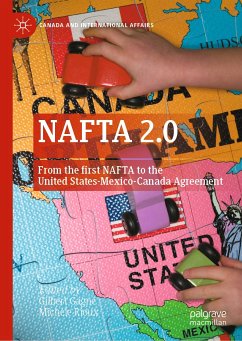The renegotiation and possible termination of the North American Free Trade Agreement (NAFTA) sparked a lot of interest and concern in light of the United States' declared objective to "rebalance the benefits" of the agreement. This edited book provides an overview of the changes brought to the NAFTA by the United States-Mexico-Canada Agreement (USMCA) or NAFTA 2.0. Grouping leading academics and experts from the three countries, the book covers the major topics in the transition from the NAFTA to the USMCA. The book also sheds light on the evolution of North American economic integration within the past three decades and reflects on the significance of the regional integration model represented by the NAFTA and now the USMCA. The book is aimed at scholars, students, officials, professionals and interested citizens concerned by the big issues surrounding North American integration and economic globalization.
Gilbert Gagné is Professor and Chair of theDepartment of Politics and International Studies at Bishop's University (Sherbrooke, Canada) and Director of the Research Group on Continental Integration (GRIC) at the Université du Québec à Montréal (UQAM) (Canada).
Michèle Rioux is Professor in the Department of Political Science at the Université du Québec à Montréal (UQAM) (Canada) and Director of the Center for the Study of Integration and Globalization (CEIM) at UQAM.
Dieser Download kann aus rechtlichen Gründen nur mit Rechnungsadresse in A, B, BG, CY, CZ, D, DK, EW, E, FIN, F, GR, HR, H, IRL, I, LT, L, LR, M, NL, PL, P, R, S, SLO, SK ausgeliefert werden.
Hinweis: Dieser Artikel kann nur an eine deutsche Lieferadresse ausgeliefert werden.


